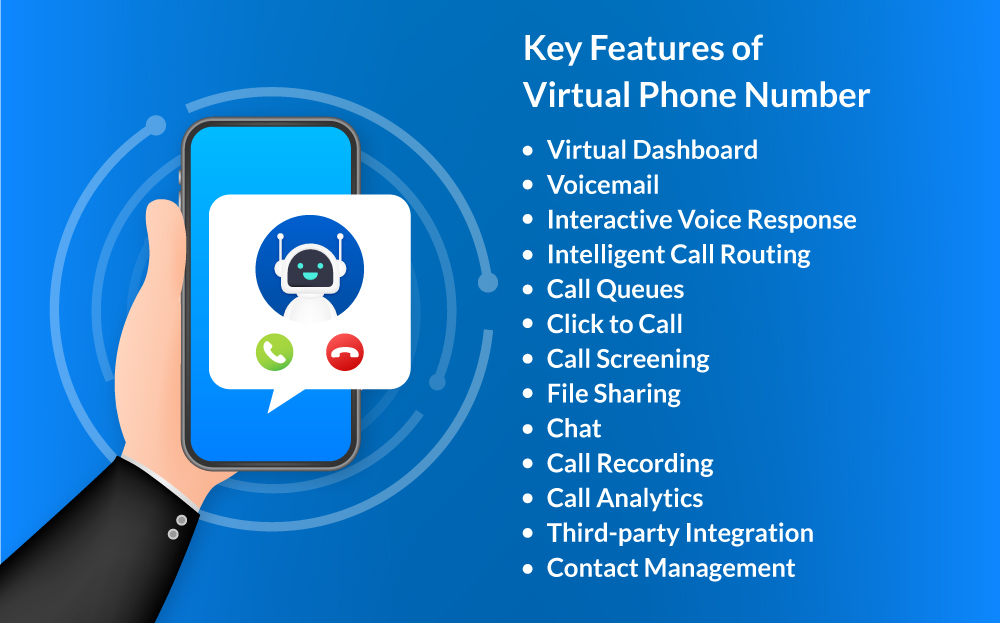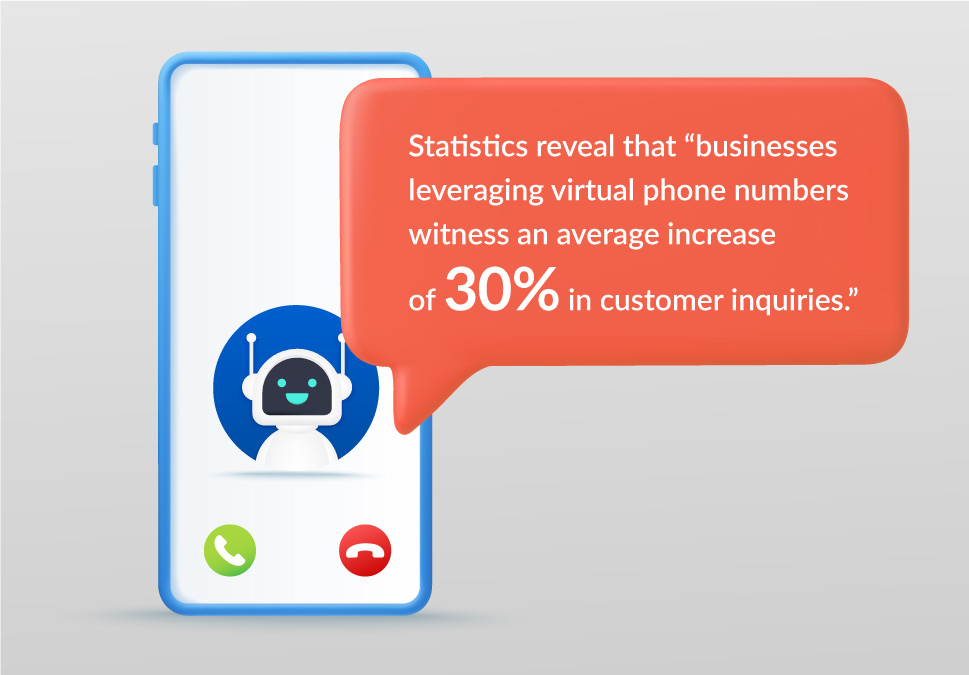The telephone is a 100-year-old invention. It has evolved with each passing decade, and today, the virtual phone number marks the latest iteration of this timeless technology.
Remember what Alexander Graham Bell once profoundly remarked? ‘When one door closes, another opens.’ In this digital age, traditional communication channels are slowly closing, making way for virtual avenues that transcend physical limitations.
Statistics don’t lie: According to a recent report by MarketsandMarkets, the global virtual mobile infrastructure market is expected to grow from $113 million in 2018 to $7.8 billion by 2023, at a compound annual growth rate of 97.8%. This exponential growth underscores a fundamental truth: the world is swiftly embracing the convenience, flexibility, and cost-effectiveness of virtual communication solutions.
In this guide, we will break down what is a virtual phone number, its numerous advantages, and how to get a virtual phone number for your business. We will also list down the top 5 virtual phone number providers.
Let’s get started.
What is a Virtual Phone Number?
A virtual phone number is similar to a standard phone number, but it is not tied to a specific phone line, location, or device. Such a phone number is cloud-based and utilizes VoIP technology for its operation. Unlike traditional landline phone numbers, virtual phone numbers can be accessed on any internet-enabled device, such as a computer, laptop, smartphone, tablet, etc.
Imagine this: You’re a budding entrepreneur in New York. However, you have clientele from diverse corners of the globe. How do you manage to bridge the gap effortlessly? The simple answer is through a Virtual Phone Number. You can have a local presence in multiple locations, all while answering calls on your laptop or smartphone from the comfort of your office in New York. Whether you’re connecting with clients in London, Tokyo, or Sydney, they dial one number, and voila! They’re instantly in touch with your business, despite the oceans that separate you.
Virtual numbers are sometimes also referred to as ‘VoIP Phone Numbers’, ‘Online Numbers’, and ‘DID numbers’. A business can purchase as many virtual phone numbers from its provider and assign them to different teams or individual employees.
Different Types of Virtual Phone Numbers
Want to know how to identify a virtual phone number? Here’s an explanation of the popularly used virtual numbers.
Local Phone Numbers
These numbers are associated with a specific geographic location and start with a particular area code, but operate via the Internet. For example, a business in New York gets a local number for Los Angeles to establish their local presence.
Toll-free Numbers
These phone numbers usually start with a unique 3-digit prefix beginning with the digit 8, such as 800, 888, 866, 833, etc. The importance of toll-free numbers lies in the fact that calling costs are charged to businesses and not customers.
International Numbers
Such a phone number is associated with a specific country outside of the current location of the business. International numbers are used to establish a global presence without requiring physical infrastructure in those areas.
Vanity Numbers
These numbers are also toll-free numbers, but with a little twist. Vanity numbers contain words or phrases that one can remember easily. For example, 1-800-PET-FOOD or 1-887-FURNITURE.
Benefits of Virtual Phone Numbers
“Statistics reveal that 82% of businesses reported cost savings when they moved to the cloud.” Source – Microsoft
Low Cost of Virtual Phone Numbers
VoIP phone numbers work on your existing internet connections, and you don’t need to invest in any large equipment or setup. You can get a VoIP number by paying a monthly subscription fee, which is quite affordable. The best part is that even if you want to get some premium phone numbers, you will still be able to save a lot of money.
Virtual Numbers are Extremely Flexible
To use a virtual phone number, you don’t need to be present at your office or workspace. In other words, you can access virtual phone numbers from anywhere in the world. This is extremely useful for remote teams and on-the-go business individuals.
Virtual Call Quality is Competitive
Virtual phone numbers make use of the internet to transmit data. This means that call quality remains superior. Moreover, leading VoIP providers employ best-in-class techniques to minimize jitter and delay in calls, ensuring crystal clear call quality.
Virtual Numbers Come with Additional Features
Virtual phone numbers are a part of cloud phone systems. These numbers often come with a variety of useful communication and collaboration features such as intelligent call routing, auto attendant, voicemail, click-to-call, etc.
Offer 24/7 Service Around the Globe
Calls arriving on virtual business phone numbers can be routed to other phone numbers based on time and location. This means that multiple agents or teams can use a single number to answer inbound calls. So even if a call arrives during odd hours, it gets instantly transferred to an available agent.
Virtual Numbers are Easily Scalable
Admins can add or remove virtual phone numbers from the business phone system within a few seconds. They can pay an add-on rate for the newly added numbers and get them removed when not required. This ensures optimal usage of resources.
Key Features of Virtual Phone Numbers

Cloud-based phone systems offer ample features that offer immense value over traditional phone systems. When looking forward to get a virtual phone number, look for these features in the cloud phone system:
Virtual Dashboard
It is the interface from wherein you can access, manage, and control all features provided by the cloud business phone system. These features include your virtual phone numbers, voicemail, analytics, recording, IVR, etc.
Voicemail
The voicemail feature is useful when no one is available to answer a call on a virtual business phone number. The caller can leave a voice message, which can be accessed later by the business.
Interactive Voice Response
IVR lets you create a menu with different options from wherein callers can select which department or agent they would like to connect with.
Intelligent Call Routing
This feature works by capturing the response selected by the caller and transferring the call accordingly. For example, technical queries are transferred to the technical team.
Call Queues
The business phone system creates call queues in which callers have to wait till an agent becomes available to take the call.
Click to Call
These are widgets that a business can use on their website or email signature so that customers can connect with them by just clicking on the link- no need to dial numbers.
Call Screening
It helps in identifying the caller before answering the call. It’s a useful tool for managing and prioritizing incoming calls.
File Sharing
Users can share media files and documents with other users. It provides an easy way to share business-related information in the form of files.
Chat
Messages can be exchanged between users instantly over the chat window. This helps in quick information sharing.
Call Recording
Interactions between agents and customers can be recorded and stored on the cloud for quality and performance purposes.
Call Analytics
This feature allows access to call logs, statistics, and analytics to track call volumes, patterns, and performance.
Third-party Integration
Virtual phone numbers can seamlessly integrate with third-party software like CRM to track and manage customer interactions.
Contact Management
Contacts can be organized and maintained in the phone system. Users can instantly find and take the required action to connect with a contact.
How Does a Virtual Phone Number Work?
Virtual phone numbers remove the physical limitations of traditional phone numbers. This means that you don’t need to invest in any secondary hardware to get a virtual phone number. These numbers rely on the internet, including WiFi or Cellular data instead of a phone company for network coverage, and do not require a SIM card. There are a lot of technicalities involved behind the scenes; however, at the surface level, virtual numbers work like this:
- When a user dials a virtual phone number, the call travels through the server controlled by the service provider.
- As per the instruction set by the user, the server forwards the call to the intended phone, such as a mobile phone, landline, or VoIP service.
- The virtual phone number makes use of internet-based protocols to transmit the call to the designated device.
Difference Between a Virtual Phone Number and a Regular Phone Number
Regular Phone Number
A regular phone number is like a fixed address and is associated with a plain old telephone service. It’s a permanent spot that’s always tied to the same place.
- A standard phone number is tied to a physical device, such as a landline phone or a SIM card
- These phone numbers are location-specific as they are associated with a specific area code, indicating a physical location.
- Standard Phone Numbers offer limited mobility as these are not easily transferable or accessible from different devices or locations without physically changing SIM cards or devices.
- Regular phone numbers operate through traditional telecommunication networks, like cellular or landline services.
- These phone numbers offer less flexibility as they usually have fewer features and customization options.
Virtual Phone Number
You can think of a virtual business phone number like a portable office. It’s like having multiple office addresses, all accessible from wherever you are present.
- Virtual phone numbers are cloud-based, which means they are not tied to any physical device
- These numbers are geographically flexible, allowing you to appear as if you’re in a different location than your actual physical address.
- Virtual phone numbers offer high mobility, i.e, you can access them from multiple devices and locations.
- These numbers operate through the internet connectivity for calls and various other services.
- Virtual phone numbers come with a wide range of additional features and integrations, fostering more versatile communications.
|
Feature |
Regular Phone Number |
Virtual Phone Number |
|
Technology |
Traditional landline (PSTN) or cellular network (SIM card) | Cloud-based, Voice over Internet Protocol (VoIP) |
|
Physical Tie |
Tied to a specific physical line or SIM card/device | Not tied to a physical line, SIM, or specific device |
|
Location |
Limited to a specific physical location/device | Accessible from anywhere with an internet connection |
|
Device Dependency |
Requires a physical phone or device with a SIM card | Can be used on any internet-enabled device (smartphone, laptop, desktop, VoIP phone) |
|
Call Routing/Forwarding |
Usually forwards to one number; limited options | Easily forwards calls to multiple numbers/devices, advanced routing rules (e.g., simultaneous ringing, time-based routing) |
|
Scalability |
Requires additional physical lines/hardware for scaling | Easily scalable for businesses; add/remove users and numbers quickly |
|
Cost |
Can involve higher upfront hardware costs and fixed contracts; higher international call rates | Often more affordable with flexible pricing plans (monthly/yearly); lower international call rates |
|
Features |
Basic calling, voicemail, SMS | Advanced features like IVR, call recording, analytics, AI-powered routing, voicemail-to-email, auto-attendants, video conferencing, and integration with other business tools |
|
Setup Time |
Can involve physical installation and technician visits | Quick and hassle-free, no physical installation needed; often set up online |
|
Privacy |
Your personal number may be exposed for business calls | Can separate personal and business calls, maintaining privacy |
|
Reliability |
Generally reliable, less dependent on internet for basic calls (landlines) | Relies on stable internet connection; call quality can be affected by internet issues |
|
Local Presence |
Tied to a specific local area code | Can acquire numbers with various area codes (local, toll-free, international) to establish a local presence anywhere |
How to Get a Virtual Phone Number?
There are many ways through which you can get a virtual phone number. Suppose you are an individual or small business that requires only one virtual phone number. In such a case, opting for an online telephone service like Google Voice would be a good choice. This service gives you a virtual phone number for free and various other useful features, such as call forwarding, voicemail, etc.
However, for established organizations or larger businesses, it is better to look for a reliable VoIP solution or cloud telephony service. These solutions typically offer advanced communication features of business phone systems, such as call recording, analytics, auto attendant, etc. Though these are paid subscription-based services, but come at very affordable costs and let you get started quite quickly.
Limitations of Virtual Phone Numbers
Virtual phone numbers offer a plethora of advantages over regular telephony, but they also have certain limitations:
Dependence on Internet Connection
Call Quality might become an issue when you are in a low-bandwidth area. Not only can it lead to low call quality, but you may also experience a call drop if the connection quality is poor.
Dependence on Vendor
The reliability and quality of the virtual phone number service depend heavily on the service provider. If the quality of the network and services is not up to the mark, then it can have a direct impact on the functionality and availability of the number.
Considerations when Getting a Virtual Phone Service
Obtaining a virtual phone number is quite an easy process. You need to contact a reliable service provider and let them know your requirements. However, there are some crucial points that you must take into consideration when you plan how to get a virtual phone number.
Is the Price Value for Money?

While there are many options to get an affordable virtual phone number, you want to make sure that it is worth your money. Before you opt for free or cheap options, consider the size of your business and make an appropriate choice.
Want a New Number or Port an Existing Number?
You have two options. You can get one or more brand-new virtual phone numbers for your business. Just select the required area codes, cities, and countries from the list provided by your vendor. Alternatively, you can port the numbers you already use into your phone system.
The information regarding the porting of pre-existing numbers will be provided by your vendor.
Top 5 Virtual Phone Number Providers
REVE Cloud Telephony

A popular and reliable cloud telephony service that offers some of the best-in-class features like 50+ countries’ Phone Numbers, Advanced Routing, Multi-level IVR, Click-to-Call, Multiple Call Termination Options, and various other useful features. It’s an ideal choice for service providers who wish to deliver cloud telephony services to contact centers and businesses with support services. You can also avail of the on-premise white-label telephony service. If you are keen to get a free demo, register here.
Vonage

This virtual phone system integrates voice, video, and messaging capabilities into one platform. It offers features like virtual numbers, call forwarding, auto-attendant, mobile integration, and various other flexible communication tools. The platform is quite user-friendly and offers integration options with third-party applications. Suitable for businesses of all sizes.
Ooma Office Phone

From customized phone calls to video calling and messaging of all types, this office phone system offers various advanced features. Based on the number of users, you can choose a plan that best matches your business requirements. Using Ooma, you can transfer your existing number to a virtual phone or get new local and toll-free numbers. Some other useful features offered are Call Blocking, Call Queuing, Virtual Receptionist, and Unlimited Calling in the U.S., Canada, and various other countries.
Zoom Phone

Another feature-rich software that brings together voice calling, video meetings, and messaging. With features like call forwarding, voicemail, and integration with other Zoom services, it is an ideal platform for businesses of any size. A business can gain global reach with local numbers in multiple countries using Zoom Phone. The platform is compatible across various devices, enabling seamless collaboration.
Google Voice

This application is ideal for businesses that are looking for simple software. The Starter plan is offered at 10 USD / User/ Month and comes with a mobile app facility for Android and iOS. Some prominent features include multi-level Auto attendant, Call Forwarding, unlimited text messaging in the U.S., Voicemail transcription, Google Calendar Integration, etc.
Conclusion

You might be using other communication channels like email and messaging for business connectivity and marketing. But bear in mind that when you connect with a client over a call, you create a ‘Human Connection’. This connection fosters trust within your clients, which is the foundation of a successful business. The potential of virtual phone numbers is limitless and can add immensely to your success.
When you decide on a virtual phone number provider that offers exactly what you need, make sure to go beyond pricing. Look for scalability, advanced features, and ease of management. Among the top providers we have mentioned in this post, REVE Cloud Telephony stands out as a promising option for its enterprise-grade infrastructure, customizable virtual number solutions, and white-label flexibility for service providers.
REVE offers you a complete platform to launch and scale with confidence. You can start with a free trial or request a personalized demo today. Our team at REVE is also available for a one-on-one consultation to help you decide the right configuration for your specific business needs.
Get your free demo now!
Frequently Asked Questions
Can virtual numbers be used for SMS and messaging?
Yes, virtual phone numbers support SMS and two-way messaging.
Can IVR be configured on virtual numbers?
Yes, most of the virtual phone numbers come with IVR features enabling efficient call routing.
Can we record calls that arrive on virtual numbers?
Yes, call recording is a common and very useful feature that is offered by providers along with virtual phone numbers.
Can I port my existing phone number to a virtual phone number platform?
Yes, you can do as the majority of the providers support number portability.
Can virtual numbers be used on multiple devices?
Yes, you can access virtual phone numbers from smartphones, IP phones, desktops, and tablets.
How can startups and small businesses benefit from virtual numbers?
Virtual phone numbers are cost-effective, flexible, and ideal for business communication without requiring physical phone systems.
Are virtual numbers secure?
Yes, but you need to choose a trusted platform that implements encryption and security protocols.




























